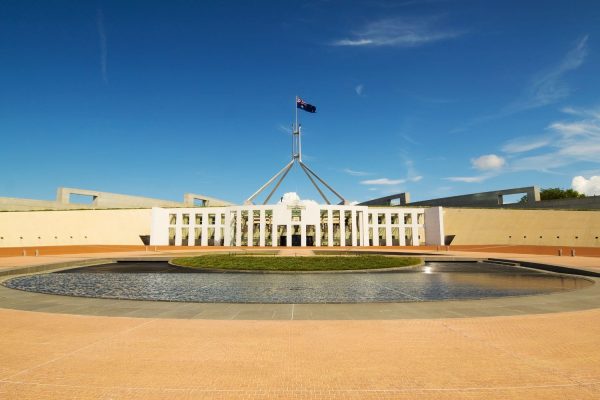report foreword
In recent years, as chronicled in countless news stories and reports into trust, integrity and accountability, leaders and institutions in general, and political leaders and institutions in particular, have become seen as self-serving, putting self and vested interests ahead of the wider public interest. There is now a deep and pervasive sense among Australian citizens that they are not well served by their social institutions or those who lead them.
Public trust in and satisfaction with Australia’s institutions of government, including democracy itself, has declined sharply, with trust and satisfaction lowest among those who do not believe that our political system allows them to influence government decision-making and policy making.
Furthermore, social cohesion in Australia is declining. Many Australians say it has gotten to the point where we are incapable of having constructive and civil debates about the issues on which we disagree. There is no shortage of information about these social trends. We see it reported in daily news stories, public opinion polls, annual research reports and assorted inquiries. However, this deluge of information can be difficult to integrate into useful knowledge, let alone a deep, integrated understanding about the state we’re in and what to do about it.
In this review of publicly available reports from a variety of Australian and international research teams, we take a helicopter view of the state of civic health in Australia. Specifically, in a curated selection of charts that relate to core aspects of civic health, we present a general picture of the state of civic health of Australia. We hope that this snapshot will help our readers find their bearings in an otherwise confusing sea of information. More importantly, we hope it will help our readers, as citizens and established and emerging leaders, understand how they can contribute to the regeneration of a thriving civic life.
WHAT IS CIVIC HEALTH?
As defined by Moore-Vissing and Mallory (2020), civic health refers to the ways in which the members of a community participate in activities that strengthen individual and community wellbeing, enhance connections, build trust, help each other, talk about important political and social issues, volunteer in social and civic organisations, stay informed about their society and communities, and participate directly in crafting solutions to various social and economic challenges.
Three basic categories need to be considered when assessing civic health:
• Civic awareness and engagement
• Sense of belonging and social connection
• Volunteering and giving
In this report, we consider all three dimensions. We begin with the global context to situate Australia in the wider world, followed by an examination of the national context, and conclude with an assessment of the civic context.
CIVIC ENGAGEMENT
Civic awareness, engagement and participation refers to how people feel, learn about, and take actions related to political, societal or local issues.
Measures of civic awareness and engagement include receiving information about civics and citizenship, trusting government and government integrity, accountability and transparency.
BELONGING AND CONNECTION
Sense of belonging and social connection includes how people interact and talk with others about important community and societal issues, and how much they trust and help their neighbours.
Measures of belonging and social connection include trusting people in the community, connecting with people of different backgrounds, helping neighbours, and discussing important issues.
VOLUNTEERING AND GIVING
Volunteering and giving includes how much people are giving their time or money to serve the community or contribute to causes they care about.
Measures of volunteering and giving include volunteering for an initiative or organisation, charitable giving, political giving, and participating in community, civic, religious and sport organisations.
Civic Engagement
Key Findings
Distrust of politicians is deep and pervasive, and citizens are pessimistic about their ability to influence politics. Few see opportunities to participate in government decision-making.
Ordinary people are pessimistic about their ability to influence politics, with dissatisfaction with democracy highest among those who say our system does not allow them to influence policy making. Political voice is important to Australians, but people tend prefer to simple forms of political voice, such as signing a
petition, rather than participating in marches and protests.
Nationally, satisfaction with democracy has declined sharply, with a steep decline in trust in politicians, political parties, and the institutions of government. Governments are widely seen as serving self and special interests ahead of the public good.

Belonging And Connection
Key Findings
Australians generally trust each other, with only a minority of our society regarding other people as untrustworthy.
Social cohesion in Australia has been quite resilient despite the challenges of recent years. Happily, Australians get on well with those in their community from different backgrounds and are willing to help their neighbours.
Nevertheless, social cohesion in Australia in under pressure. Almost half of us think Australian is more divided today than in the past, creating the risk of polarisation. Two-thirds say it has gotten to the point where we are incapable of having constructive debates about societal issues we disagree on.

VOLUNTEERING AND GIVING
Key Findings
Australians generally trust each other, with only a minority of our society regarding other people as untrustworthy.
Social cohesion in Australia has been quite resilient despite the challenges of recent years. Happily, Australians get on well with those in their community from different backgrounds and are willing to help their neighbours.
Nevertheless, social cohesion in Australia in under pressure. Almost half of us think Australian is more divided today than in the past, creating the risk of polarisation. Two-thirds say it has gotten to the point where we are incapable of having constructive debates about societal issues we disagree on.

ABOUT THE REPORT
This project was made possible by the generous support of the Menzies Foundation and the Graham Family Foundation.
The research team would like to extend our sincere thanks to Liz Gillies
of the Menzies Foundation and Stephen and Margaret Graham of the
Graham Family Foundation for their support and ongoing commitment
to fostering leadership for the greater good in Australia and beyond.
To view and download a copy of this report please click below.




